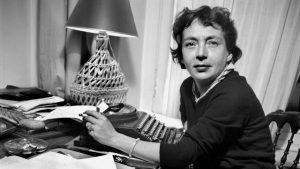Emma Ramadan at The Quarterly Conversation:
 When I first read Marguerite Duras’s Moderato Cantabile for my high school AP French class, an alarm went off on me. That I was reading the words of someone who understood love in the same way I did. At that point in my life I hadn’t yet experienced love, but it didn’t matter. It was a foreshadowing of what was to come, of what I already knew to be true. The next year, in a college French class, I read Duras’s The Lover. From the first page (J’ai un visage détruit) I saw myself again. I felt recognized. But even as I was, in Kate Briggs’s words, underlining, typing the passage out, capturing it on my phone…even in its plenitude, even as it is right now filling me up, there is, I feel, something missing. What is missing is me: my action, my further activity…the audacious counteraction—of the active force that is me. Perhaps in reading these words, the ache that opened up in me was not from identification but from feeling that this writing wouldn’t be complete until I had acted my own force on it. The drive to translate—not for glory, not for recognition, not for money (obviously): to complete the text (in my eyes) by adding my own force to it. When I read a given book and feel the jolt Briggs describes as a matter of intensely felt identification, it’s not the text, it’s me in the text. In the words of Duras (in our translation of her), What moves me is myself.
When I first read Marguerite Duras’s Moderato Cantabile for my high school AP French class, an alarm went off on me. That I was reading the words of someone who understood love in the same way I did. At that point in my life I hadn’t yet experienced love, but it didn’t matter. It was a foreshadowing of what was to come, of what I already knew to be true. The next year, in a college French class, I read Duras’s The Lover. From the first page (J’ai un visage détruit) I saw myself again. I felt recognized. But even as I was, in Kate Briggs’s words, underlining, typing the passage out, capturing it on my phone…even in its plenitude, even as it is right now filling me up, there is, I feel, something missing. What is missing is me: my action, my further activity…the audacious counteraction—of the active force that is me. Perhaps in reading these words, the ache that opened up in me was not from identification but from feeling that this writing wouldn’t be complete until I had acted my own force on it. The drive to translate—not for glory, not for recognition, not for money (obviously): to complete the text (in my eyes) by adding my own force to it. When I read a given book and feel the jolt Briggs describes as a matter of intensely felt identification, it’s not the text, it’s me in the text. In the words of Duras (in our translation of her), What moves me is myself.
more here.
